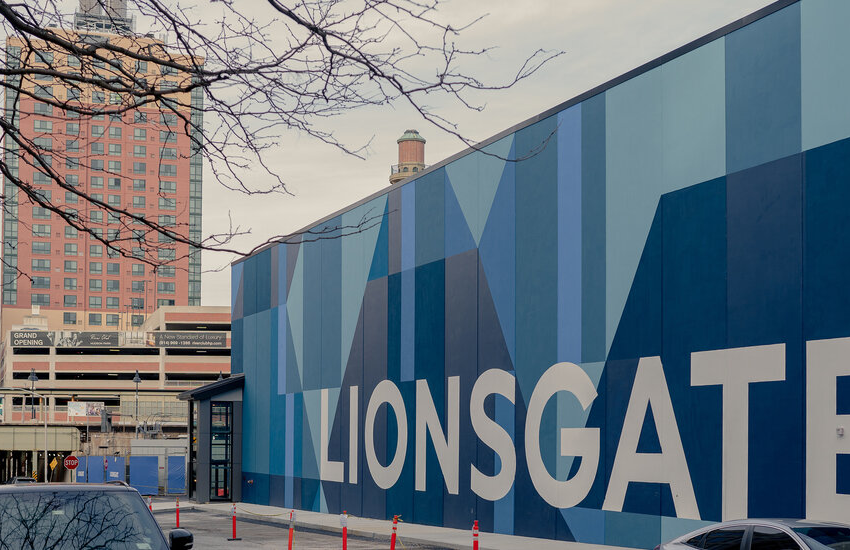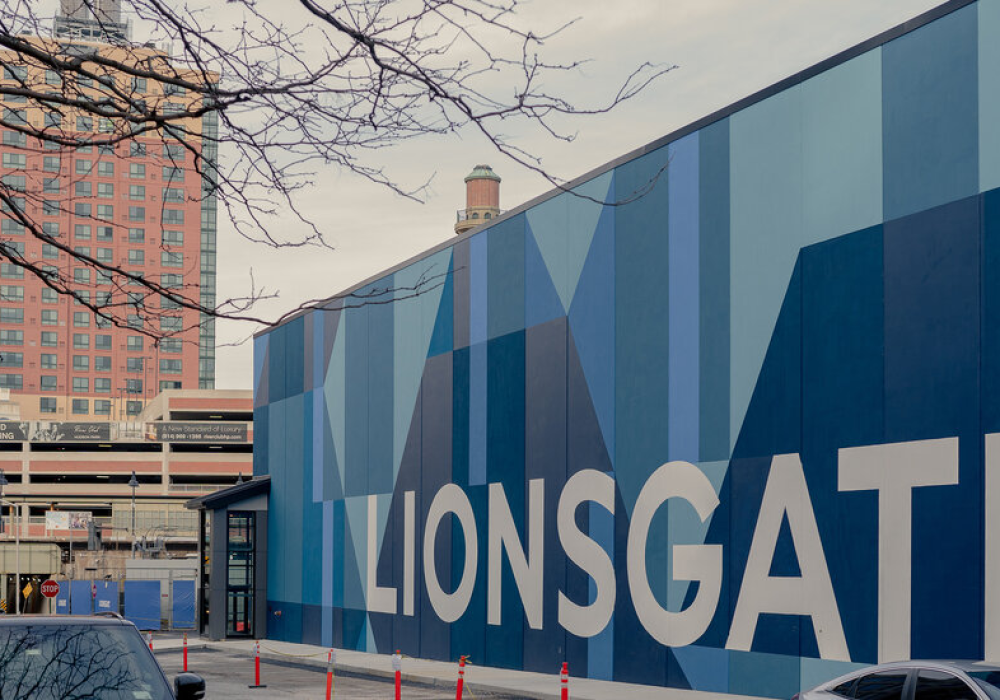“Run the World,” a Starz television series about four 30-something Black women navigating work and love, is set in Harlem. In its first season, the camera lingers over landmarks in the neighborhood, like the Harriet Tubman statue on West 122nd Street, as well as locations across New York City.
But when the show begins filming its second season in two months and Ella (Andrea Bordeaux), Sondi (Corbin Reid), Renee (Bresha Webb) and Whitney (Amber Stevens West) reunite to go clubbing, commiserate over cocktails and tumble into bed with their latest flames, they will be doing much of it slightly north of the city, inside a big film production facility that officially opens today in Yonkers.
Great Point Studios, which has created the $500 million campus, Lionsgate Studios Yonkers, claims the ever-expanding facility, scheduled to be completed next year, will surpass anything New York City has to offer.
Built around the site of an old Otis elevator factory overlooking the Hudson River in newly invigorated downtown Yonkers, the complex currently houses three soundstages, six “talent suites” for actors, dozens of dressing rooms and hair-and-makeup stations, dedicated writers rooms, a carpentry shop for set construction and office spaces. But that’s just the beginning.
By the end of next year, the 14.5-acre campus plans to have a backlot (for outdoor scenes), two screening rooms, a postproduction area for editing and a total of 11 soundstages, several of them already claimed by Lionsgate.
And now Great Point says it is in contract to buy land for a second production facility in Yonkers. The combined properties, with eight additional soundstages, “will be hands-down the largest in the Northeast,” said Robert Halmi Jr., the company’s chief executive and president, and a longtime producer.
All of which will go toward fulfilling the decade-long dream of Mayor Mike Spano: making Yonkers “the Burbank of New York,” a reference to the California city outside Los Angeles that is home to major film studios. “We are going to be Hollywood on the Hudson,” he said in a phone interview.
But the television production business is already booming in New York City. And while it’s certainly common in the industry to shoot in a different place from where a show is set, will moving the production of “Run the World” and other programs set in New York City to Westchester County be a snub to the Big Apple?
“Not at all,” said Anne del Castillo, New York City’s media and entertainment commissioner. “I think there is enough production to go around.”
Indeed, the goings-on in both cities are part of a wider surge in film production in the metropolitan area, where the industry got its start in the 1890s before decamping to California.
But film production has been trickling back for some time, lured by tax incentives and the fact that so many actors, directors and other film professionals live in and around New York.
The city has over 250 soundstages — essentially, black boxes in which any sort of scene can be conjured. Some are quite small, however, and may have low ceilings or freestanding columns that interrupt space, having been built in converted warehouses or other industrial buildings. New York still lags behind Los Angeles in terms of square footage for soundstages but is ahead of Atlanta, according to the real estate services firm CBRE.
But now the proliferation of streaming platforms and seemingly insatiable appetite for content — driven in part by binge-watching during the pandemic — has set off a frenzy of building soundstages, so-called because they are soundproofed. Netflix, for instance, is planning a major production hub on an old army base in Fort Monmouth, N.J.
In New York, existing facilities are expanding and new ones are being built. In the latter category, Wildflower Studios in Astoria, Queens — a project Robert De Niro is a partner in — will have 11 soundstages when it is completed next year. And Steiner Studios (based at the Brooklyn Navy Yard) will begin work on an eight-soundstage facility in Sunset Park, Brooklyn, this spring.
Statewide, there are over 130 qualified production facilities containing over 450 soundstages and over five million square feet, according to Empire State Development; more than half of these properties have opened or been certified in the last five years.
Technology has fed the explosive growth in soundstages; with advances in computer graphics and so-called green screens, artificial backdrops have become ever more lifelike.
For Lionsgate, which owns Starz, the new Yonkers facility offers “certainty,” said Kevin Beggs, the chair of Lionsgate Television. “We don’t have to spend six weeks canvassing the city of New York and environs” for locations, he said.
On a tour last week, however, the new facility was not quite ready for its close-up. “Run the World” is scheduled to begin filming in March on two soundstages, one of them an expansive 20,000 square feet. But in a third soundstage, men in protective gear were still applying a crumbly, black echo-canceling substance. Furniture for support spaces had yet to arrive.
The pandemic delayed the project for nearly a year, said Mr. Halmi. Lockdowns stopped construction and steel and concrete were in short supply owing to supply chain issues.
At the complex, new low-rise buildings have a jazzy blue paint job and big Lionsgate logo. The factory’s brick buildings, built around the turn of the 20th century, are being repurposed as offices, and the factory’s old power plant, where you can see the base of its still-intact smokestack, will one day be a grand entrance.
The three completed soundstages are already spoken for, although there is some office space still vacant, said Mr. Halmi, who founded the Hallmark Channel. Mediapro, a Spanish-language content provider, has claimed at least one of the soundstages being built this year.
Mr. Halmi is hoping that prop, music production and special effects companies will lease offices at the facility. Syracuse University’s S.I. Newhouse School of Public Communications is starting an internship program this spring in a loftlike space with a small classroom.
Lionsgate sits in an industrial park next to a Kawasaki plant that assembles subway cars. It is also steps from the Yonkers train station, making it a quick commute from Manhattan’s Grand Central Terminal or Penn Station.
Five Movies to Watch This Winter
A second, soon-to-be-acquired site, a 19th-century orphanage on 28 acres landscaped by Frederick Law Olmsted, will be converted to offices. Mr. Halmi said he hoped to break ground on the soundstages before the end of the year, but the $52.5 million site will need to be rezoned first.
Mr. Spano has been trying to get Yonkers into the movie business since he was elected mayor in 2012, and learned from the state’s film office about the “list of things we were doing wrong,” he said.
For one thing, he learned from state officials that Yonkers charged a stage fee other cities didn’t, so out that went. Those same officials came up with “Burbank of New York,” Mr. Spano said.
Nearby businesses — coffee shops, restaurants, dry cleaners — stand to benefit from the comings and goings of actors, grips, camera operators and others, once the studio is in full swing, local business proponents say.
“It’s a plus for all of us,” said Lou Vlahopoulos, owner of Paxos Grill & Café, an institution on Main Street in Yonkers.
As for “Run the World,” which began moving in sets this week, the studio work in Yonkers does not represent a loss for New York City; production for the first season was done at a studio on Long Island.
Outdoor filming will continue to take place on location in New York, said Mr. Beggs, of Lionsgate. Ms. del Castillo, the commissioner of New York’s media office, confirmed as much.
“I know they’re going to,” she said, “because we have their permits.”












